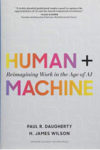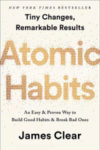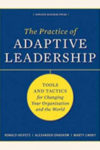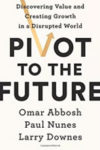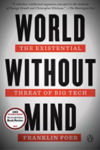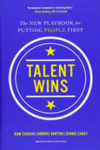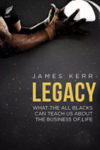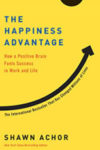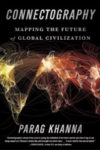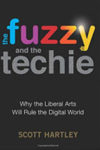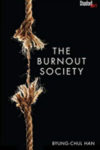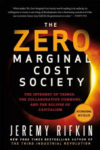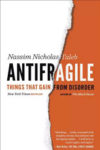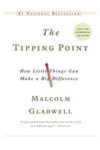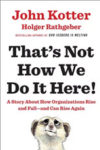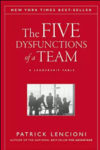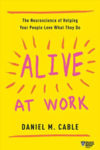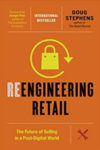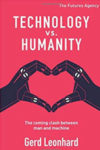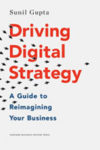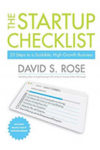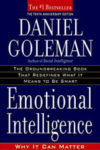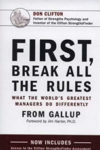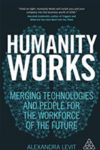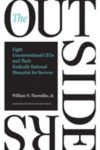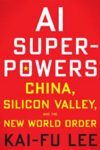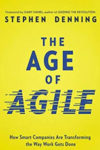Executives’ recommended readings
Raffaella Temporiti
Human Resources Director for Accenture – Italy, Central Eastern Europe and Greece
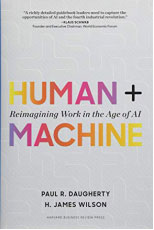
AI is radically transforming business. Are you ready?
Look around you. Artificial intelligence is no longer just a futuristic notion. It’s here right now–in software that senses what we need, supply chains that “think” in real time, and robots that respond to changes in their environment. Twenty-first-century pioneer companies are already using AI to innovate and grow fast. The bottom line is this: Businesses that understand how to harness AI can surge ahead. Those that neglect it will fall behind. Which side are you on?
In Human + Machine, Accenture leaders Paul R. Daugherty and H. James (Jim) Wilson show that the essence of the AI paradigm shift is the transformation of all business processes within an organization–whether related to breakthrough innovation, everyday customer service, or personal productivity habits. As humans and smart machines collaborate ever more closely, work processes become more fluid and adaptive, enabling companies to change them on the fly–or to completely reimagine them. AI is changing all the rules of how companies operate.
Based on the authors’ experience and research with 1,500 organizations, the book reveals how companies are using the new rules of AI to leap ahead on innovation and profitability, as well as what you can do to achieve similar results. It describes six entirely new types of hybrid human + machine roles that every company must develop, and it includes a “leader’s guide” with the five crucial principles required to become an AI-fueled business.
Human + Machine provides the missing and much-needed management playbook for success in our new age of AI.
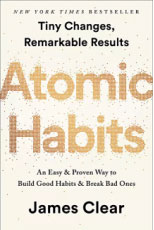
Tiny Changes, Remarkable Results
No matter your goals, Atomic Habits offers a proven framework for improving–every day. James Clear, one of the world’s leading experts on habit formation, reveals practical strategies that will teach you exactly how to form good habits, break bad ones, and master the tiny behaviors that lead to remarkable results. If you’re having trouble changing your habits, the problem isn’t you. The problem is your system. Bad habits repeat themselves again and again not because you don’t want to change, but because you have the wrong system for change. You do not rise to the level of your goals. You fall to the level of your systems. Here, you’ll get a proven system that can take you to new heights.
Clear is known for his ability to distill complex topics into simple behaviors that can be easily applied to daily life and work. Here, he draws on the most proven ideas from biology, psychology, and neuroscience to create an easy-to-understand guide for making good habits inevitable and bad habits impossible. Along the way, readers will be inspired and entertained with true stories from Olympic gold medalists, award-winning artists, business leaders, life-saving physicians, and star comedians who have used the science of small habits to master their craft and vault to the top of their field.
Learn how to:
* make time for new habits (even when life gets crazy);
* overcome a lack of motivation and willpower;
* design your environment to make success easier;
* get back on track when you fall off course;
…and much more.
Atomic Habits will reshape the way you think about progress and success, and give you the tools and strategies you need to transform your habits–whether you are a team looking to win a championship, an organization hoping to redefine an industry, or simply an individual who wishes to quit smoking, lose weight, reduce stress, or achieve any other goal.
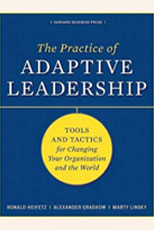
When change requires you to challenge people’s familiar reality, it can be difficult, dangerous work. Whatever the context–whether in the private or the public sector–many will feel threatened as you push though major changes. But as a leader, you need to find a way to make it work.
Ron Heifetz first defined this problem with his distinctive theory of adaptive leadership in Leadership Without Easy Answers. In a second book, Leadership on the Line, Heifetz and coauthor Marty Linsky highlighted the individual and organizational dangers of leading through deep change in business, politics, and community life. Now, Heifetz, Linsky, and coauthor Alexander Grashow are taking the next step: The Practice of Adaptive Leadership is a hands-on, practical guide containing stories, tools, diagrams, cases, and worksheets to help you develop your skills as an adaptive leader, able to take people outside their comfort zones and assess and address the toughest challenges.
The authors have decades of experience helping people and organizations create cultures of adaptive leadership. In today’s rapidly changing world, The Practice of Adaptive Leadership can be your handbook to meeting the demands of leadership in the midst of complexity.
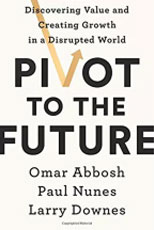
The proven, effective strategy for reinventing your business in the age of ever-present disruption
Disruption by digital technologies? That’s not a new story. But what is new is the “wise pivot,” a replicable strategy for harnessing disruption to survive, grow, and be relevant to the future. It’s a strategy for perpetual reinvention across the old, now, and new elements of any business.
Rapid recent advances in technology are forcing leaders in every business to rethink long-held beliefs about how to adapt to emerging technologies and new markets. What has become abundantly clear: in the digital age, conventional wisdom about business transformation no longer works, if it ever did.
Based on Accenture’s own experience of reinventing itself in the face of disruption, the company’s real world client work, and a rigorous two-year study of thousands of businesses across 30 industries, Pivot to the Future reveals methodical and bold moves for finding and releasing new sources of trapped value-unlocked by bridging the gap between what is technologically possible and how technologies are being used. The freed value enables companies to simultaneously reinvent their legacy, and current and new businesses.
Pivot to the Future is for leaders who seek to turn the existential threats of today and tomorrow into sustainable growth, with the courage to understand that a wise pivot strategy is not a one-time event, but a commitment to a future of perpetual reinvention, where one pivot is followed by the next and the next.
Stefano Lucchini
Chief Institutional Affairs and External Communication Officer – Intesa Sanpaolo
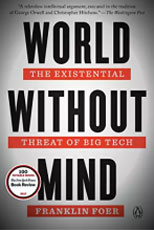
Franklin Foer reveals the existential threat posed by big tech, and in his brilliant polemic gives us the toolkit to fight their pervasive influence.
Over the past few decades there has been a revolution in terms of who controls knowledge and information. This rapid change has imperiled the way we think. Without pausing to consider the cost, the world has rushed to embrace the products and services of four titanic corporations. We shop with Amazon; socialize on Facebook; turn to Apple for entertainment; and rely on Google for information. These firms sell their efficiency and purport to make the world a better place, but what they have done instead is to enable an intoxicating level of daily convenience. As these companies have expanded, marketing themselves as champions of individuality and pluralism, their algorithms have pressed us into conformity and laid waste to privacy. They have produced an unstable and narrow culture of misinformation, and put us on a path to a world without private contemplation, autonomous thought, or solitary introspection—a world without mind. In order to restore our inner lives, we must avoid being coopted by these gigantic companies, and understand the ideas that underpin their success.
Elegantly tracing the intellectual history of computer science—from Descartes and the enlightenment to Alan Turing to Stewart Brand and the hippie origins of today’s Silicon Valley—Foer exposes the dark underpinnings of our most idealistic dreams for technology. The corporate ambitions of Google, Facebook, Apple, and Amazon, he argues, are trampling longstanding liberal values, especially intellectual property and privacy. This is a nascent stage in the total automation and homogenization of social, political, and intellectual life. By reclaiming our private authority over how we intellectually engage with the world, we have the power to stem the tide.
At stake is nothing less than who we are, and what we will become. There have been monopolists in the past but today’s corporate giants have far more nefarious aims. They’re monopolists who want access to every facet of our identities and influence over every corner of our decision-making. Until now few have grasped the sheer scale of the threat. Foer explains not just the looming existential crisis but the imperative of resistance.
Massimiliano Maffioli
Chief People Officer – McDonald’s Italy
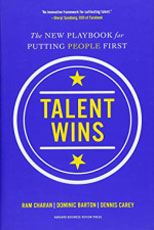
Radical Advice for Reinventing Talent and HR
Most executives today recognize the competitive advantage of human capital, and yet the talent practices their organizations use are stuck in the twentieth century.
Typical talent-planning and HR processes are designed for predictable environments, traditional ways of getting work done, and organizations where “lines and boxes” still define how people are managed. As work and organizations have become more fluid–and business strategy is no longer about planning years ahead but about sensing and seizing new opportunities and adapting to a constantly changing environment–companies must deploy talent in new ways to remain competitive.
Turning conventional views on their heads, talent and leadership experts Ram Charan, Dominic Barton, and Dennis Carey provide leaders with a new and different playbook for acquiring, managing, and deploying talent–for today’s agile, digital, analytical, technologically driven strategic environment–and for creating the HR function that business needs. Filled with examples of forward-thinking companies that have adopted radical new approaches to talent (such as ADP, Amgen, BlackRock, Blackstone, Haier, ING, Marsh, Tata Communications, Telenor, and Volvo), as well as the juggernauts and the startups of Silicon Valley, this book shows leaders how to bring the rigor that they apply to financial capital to their human capital–elevating HR to the same level as finance in their organizations.
Providing deep, expert insight and advice for what needs to change and how to change it, this is the definitive book for reimagining and creating a talent-driven organization that wins.

In Legacy, best-selling author James Kerr goes deep into the heart of the world’s most successful sporting team, the legendary All Blacks of New Zealand, to reveal 15 powerful and practical lessons for leadership and business.
Legacy is a unique, inspiring handbook for leaders in all fields, and asks: What are the secrets of success – sustained success? How do you achieve world-class standards, day after day, week after week, year after year? How do you handle pressure? How do you train to win at the highest level? What do you leave behind you after you’re gone?
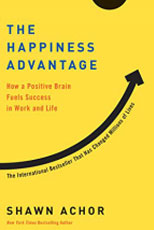
Our most commonly held formula for success is broken.
Conventional wisdom holds that if we work hard we will be more successful, and if we are more successful, then we’ll be happy. If we can just find that great job, win that next promotion, lose those five pounds, happiness will follow. But recent discoveries in the field of positive psychology have shown that this formula is actually backward: Happiness fuels success, not the other way around.
When we are positive, our brains become more engaged, creative, motivated, energetic, resilient, and productive at work. This isn’t just an empty mantra. This discovery has been repeatedly borne out by rigorous research in psychology and neuroscience, management studies, and the bottom lines of organizations around the globe.
In The Happiness Advantage, Shawn Achor, who spent over a decade living, researching, and lecturing at Harvard University, draws on his own research—including one of the largest studies of happiness and potential at Harvard and others at companies like UBS and KPMG—to fix this broken formula. Using stories and case studies from his work with thousands of Fortune 500 executives in 42 countries, Achor explains how we can reprogram our brains to become more positive in order to gain a competitive edge at work.
Isolating seven practical, actionable principles that have been tried and tested everywhere from classrooms to boardrooms, stretching from Argentina to Zimbabwe, he shows us how we can capitalize on the Happiness Advantage to improve our performance and maximize our potential. Among the principles he outlines:
• The Tetris Effect: how to retrain our brains to spot patterns of possibility, so we can see—and seize—opportunities wherever we look.
• The Zorro Circle: how to channel our efforts on small, manageable goals, to gain the leverage to gradually conquer bigger and bigger ones.
• Social Investment: how to reap the dividends of investing in one of the greatest predictors of success and happiness—our social support network
A must-read for everyone trying to excel in a world of increasing workloads, stress, and negativity, The Happiness Advantage isn’t only about how to become happier at work. It’s about how to reap the benefits of a happier and more positive mind-set to achieve the extraordinary in our work and in our lives.
Marco Alberti
Head of International Institutional Affairs – Enel SpA
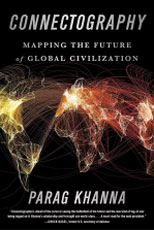
From the visionary bestselling author of The Second World and How to Run the World comes a bracing and authoritative guide to a future shaped less by national borders than by global supply chains, a world in which the most connected powers—and people—will win.
Connectivity is the most revolutionary force of the twenty-first century. Mankind is reengineering the planet, investing up to ten trillion dollars per year in transportation, energy, and communications infrastructure linking the world’s burgeoning megacities together. This has profound consequences for geopolitics, economics, demographics, the environment, and social identity. Connectivity, not geography, is our destiny.
In Connectography, visionary strategist Parag Khanna travels from Ukraine to Iran, Mongolia to North Korea, Pakistan to Nigeria, and across the Arctic Circle and the South China Sea to explain the rapid and unprecedented changes affecting every part of the planet. He shows how militaries are deployed to protect supply chains as much as borders, and how nations are less at war over territory than engaged in tugs-of-war over pipelines, railways, shipping lanes, and Internet cables. The new arms race is to connect to the most markets—a race China is now winning, having launched a wave of infrastructure investments to unite Eurasia around its new Silk Roads. The United States can only regain ground by fusing with its neighbors into a super-continental North American Union of shared resources and prosperity.
Connectography offers a unique and hopeful vision for the future. Khanna argues that new energy discoveries and technologies have eliminated the need for resource wars; ambitious transport corridors and power grids are unscrambling Africa’s fraught colonial borders; even the Arab world is evolving a more peaceful map as it builds resource and trade routes across its war-torn landscape. At the same time, thriving hubs such as Singapore and Dubai are injecting dynamism into young and heavily populated regions, cyber-communities empower commerce across vast distances, and the world’s ballooning financial assets are being wisely invested into building an inclusive global society. Beneath the chaos of a world that appears to be falling apart is a new foundation of connectivity pulling it together.
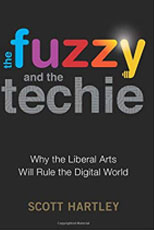
A leading venture capitalist offers surprising revelations on who is going to be driving innovation in the years to come
Scott Hartley first heard the terms fuzzy and techie while studying political science at Stanford University. If you majored in the humanities or social sciences, you were a fuzzy. If you majored in the computer sciences, you were a techie. This informal division has quietly found its way into a default assumption that has misled the business world for decades: that it’s the techies who drive innovation.
But in this brilliantly contrarian book, Hartley reveals the counterintuitive reality of business today: it’s actually the fuzzies – not the techies – who are playing the key roles in developing the most creative and successful new business ideas. They are often the ones who understand the life issues that need solving and offer the best approaches for doing so. It is they who are bringing context to code, and ethics to algorithms.They also bring the management and communication skills, the soft skills that are so vital to spurring growth.
Hartley looks inside some of today’s most dynamic new companies, reveals breakthrough fuzzy-techie collaborations, and explores how such collaborations are at the center of innovation in business, education, and government, and why liberal arts are still relevant in our techie world.
Annalisa Sala
HR Director PAN Europe – Mattel
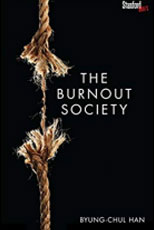
Our competitive, service-oriented societies are taking a toll on the late-modern individual. Rather than improving life, multitasking, “user-friendly” technology, and the culture of convenience are producing disorders that range from depression to attention deficit disorder to borderline personality disorder. Byung-Chul Han interprets the spreading malaise as an inability to manage negative experiences in an age characterized by excessive positivity and the universal availability of people and goods. Stress and exhaustion are not just personal experiences, but social and historical phenomena as well. Denouncing a world in which every against-the-grain response can lead to further disempowerment, he draws on literature, philosophy, and the social and natural sciences to explore the stakes of sacrificing intermittent intellectual reflection for constant neural connection

In The Zero Marginal Cost Society, New York Times bestselling author Jeremy Rifkin describes how the emerging Internet of Things is speeding us to an era of nearly free goods and services, precipitating the meteoric rise of a global Collaborative Commons and the eclipse of capitalism.
Rifkin uncovers a paradox at the heart of capitalism that has propelled it to greatness but is now taking it to its death―the inherent entrepreneurial dynamism of competitive markets that drives productivity up and marginal costs down, enabling businesses to reduce the price of their goods and services in order to win over consumers and market share. (Marginal cost is the cost of producing additional units of a good or service, if fixed costs are not counted.) While economists have always welcomed a reduction in marginal cost, they never anticipated the possibility of a technological revolution that might bring marginal costs to near zero, making goods and services priceless, nearly free, and abundant, and no longer subject to market forces.
Now, a formidable new technology infrastructure―the Internet of things (IoT)―is emerging with the potential of pushing large segments of economic life to near zero marginal cost in the years ahead. Rifkin describes how the Communication Internet is converging with a nascent Energy Internet and Logistics Internet to create a new technology platform that connects everything and everyone. Billions of sensors are being attached to natural resources, production lines, the electricity grid, logistics networks, recycling flows, and implanted in homes, offices, stores, vehicles, and even human beings, feeding Big Data into an IoT global neural network. Prosumers can connect to the network and use Big Data, analytics, and algorithms to accelerate efficiency, dramatically increase productivity, and lower the marginal cost of producing and sharing a wide range of products and services to near zero, just like they now do with information goods.
The plummeting of marginal costs is spawning a hybrid economy―part capitalist market and part Collaborative Commons―with far reaching implications for society, according to Rifkin. Hundreds of millions of people are already transferring parts of their economic lives to the global Collaborative Commons. Prosumers are plugging into the fledgling IoT and making and sharing their own information, entertainment, green energy, and 3D-printed products at near zero marginal cost. They are also sharing cars, homes, clothes and other items via social media sites, rentals, redistribution clubs, and cooperatives at low or near zero marginal cost. Students are enrolling in free massive open online courses (MOOCs) that operate at near zero marginal cost. Social entrepreneurs are even bypassing the banking establishment and using crowdfunding to finance startup businesses as well as creating alternative currencies in the fledgling sharing economy. In this new world, social capital is as important as financial capital, access trumps ownership, sustainability supersedes consumerism, cooperation ousts competition, and “exchange value” in the capitalist marketplace is increasingly replaced by “sharable value” on the Collaborative Commons.
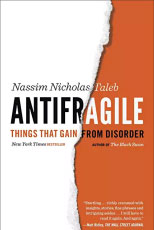
Antifragile is a standalone book in Nassim Nicholas Taleb’s landmark Incerto series, an investigation of opacity, luck, uncertainty, probability, human error, risk, and decision-making in a world we don’t understand. The other books in the series are Fooled by Randomness, The Black Swan, Skin in the Game, and The Bed of Procrustes.
Nassim Nicholas Taleb, the bestselling author of The Black Swan and one of the foremost thinkers of our time, reveals how to thrive in an uncertain world.
Just as human bones get stronger when subjected to stress and tension, and rumors or riots intensify when someone tries to repress them, many things in life benefit from stress, disorder, volatility, and turmoil. What Taleb has identified and calls “antifragile” is that category of things that not only gain from chaos but need it in order to survive and flourish.
In The Black Swan, Taleb showed us that highly improbable and unpredictable events underlie almost everything about our world. In Antifragile, Taleb stands uncertainty on its head, making it desirable, even necessary, and proposes that things be built in an antifragile manner. The antifragile is beyond the resilient or robust. The resilient resists shocks and stays the same; the antifragile gets better and better.
Furthermore, the antifragile is immune to prediction errors and protected from adverse events. Why is the city-state better than the nation-state, why is debt bad for you, and why is what we call “efficient” not efficient at all? Why do government responses and social policies protect the strong and hurt the weak? Why should you write your resignation letter before even starting on the job? How did the sinking of the Titanic save lives? The book spans innovation by trial and error, life decisions, politics, urban planning, war, personal finance, economic systems, and medicine. And throughout, in addition to the street wisdom of Fat Tony of Brooklyn, the voices and recipes of ancient wisdom, from Roman, Greek, Semitic, and medieval sources, are loud and clear.
Paolo Le Pera
HR Director Italy – Philip Morris International
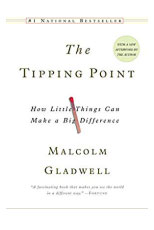
The tipping point is that magic moment when an idea, trend, or social behavior crosses a threshold, tips, and spreads like wildfire. Just as a single sick person can start an epidemic of the flu, so too can a small but precisely targeted push cause a fashion trend, the popularity of a new product, or a drop in the crime rate. This widely acclaimed bestseller, in which Malcolm Gladwell explores and brilliantly illuminates the tipping point phenomenon, is already changing the way people throughout the world think about selling products and disseminating ideas.
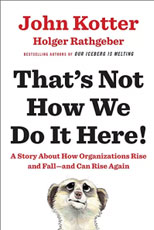
What’s the worst thing you can hear when you have a good idea at work?
“That’s not how we do it here!”
In their iconic bestseller Our Iceberg Is Melting, John Kotter and Holger Rathgeber used a simple fable about penguins to explain the process of lead ing people through major changes. Now, ten years later, they’re back with another must-read story that will help any team or organization cope with their biggest challenges and turn them into exciting opportunities.
Once upon a time a clan of meerkats lived in the Kalahari, a region in southern Africa. After years of steady growth, a drought has sharply reduced the clan’s resources, and deadly vulture attacks have increased. As things keep getting worse, the har mony of the clan is shattered. The executive team quarrels about possible solutions, and sugges tions from frontline workers face a soul-crushing response: “That’s not how we do it here!”
So Nadia, a bright and adventurous meerkat, hits the road in search of new ideas to help her trou bled clan. She discovers a much smaller group that operates very differently, with much more teamwork and agility. These meerkats have developed innova tive solutions to find food and evade the vultures. But not everything in this small clan is as perfect as it seems at first.
Can Nadia figure out how to combine the best of both worlds—a large, disciplined, well-managed clan and a small, informal, inspiring clan—before it’s too late?
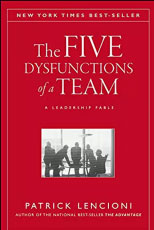
In The Five Dysfunctions of a Team Patrick Lencioni once again offers a leadership fable that is as enthralling and instructive as his first two best-selling books, The Five Temptations of a CEO and The Four Obsessions of an Extraordinary Executive. This time, he turns his keen intellect and storytelling power to the fascinating, complex world of teams.
Kathryn Petersen, Decision Tech’s CEO, faces the ultimate leadership crisis: Uniting a team in such disarray that it threatens to bring down the entire company. Will she succeed? Will she be fired? Will the company fail? Lencioni’s utterly gripping tale serves as a timeless reminder that leadership requires as much courage as it does insight.
Throughout the story, Lencioni reveals the five dysfunctions which go to the very heart of why teams even the best ones-often struggle. He outlines a powerful model and actionable steps that can be used to overcome these common hurdles and build a cohesive, effective team. Just as with his other books, Lencioni has written a compelling fable with a powerful yet deceptively simple message for all those who strive to be exceptional team leaders.
Daniela Pirro
HR Director Italy and HR Retail Director EMEA – Estee Lauder Companies Europe
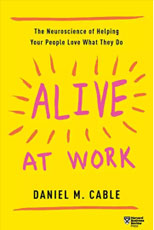
Poll after poll has confirmed that an astonishing number of workers are disengaged from their work. Why is this happening? And how can we fix the problem?
In this bold, enlightening book, social psychologist and professor Daniel M. Cable takes leaders into the minds of workers and reveals the surprising secret to restoring their zest for work.
Disengagement isn’t a motivational problem, it’s a biological one. Humans aren’t built for routine and repetition. We’re designed to crave exploration, experimentation, and learning–in fact, there’s a part of our brains, which scientists have coined “the seeking system,” that rewards us for taking part in these activities. But the way organizations are run prevents many of us from following our innate impulses. As a result, we shut down.
Things need to change. More than ever before, employee creativity and engagement are needed to win. Fortunately, it won’t take an extensive overhaul of your organizational culture to get started. With small nudges, you can personally help people reach their fullest potential.
Alive at Work reveals:
- How to encourage people to bring their best selves to work and use their greatest strengths to help your organization flourish
- How to build creative environments that motivate people to share ideas, work smarter, and embrace change
- How to enhance people’s connection to their work and your customers
- How to create personalized experiences that help people feel a deeper sense of purpose
Filled with fascinating stories from the author’s extensive research, Alive at Work is the inspirational guide that you need to tap into the passion, creativity, and purpose fizzing beneath the surface of every person who falls under your leadership.
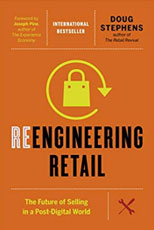
Since the release of Doug Stephens’ first book, The Retail Revival, change in the global retail sector has accelerated beyond even the boldest forecasts. As predicted, online giants like Amazon and Alibaba.com are growing at a dizzying pace. Hundreds of well-known brick and mortar retailers have closed their doors, and brands and retailers across categories are struggling to understand the shifting needs and expectations of a new consumer.
Picking up where The Retail Revival left off, Reengineering Retail explores the coming revolution in the global retail and consumer goods market, offering sales and marketing executives a roadmap to the future.
Author and internationally renowned consumer futurist, Doug Stephens, paints a bold vision of the future where every aspect of the retail experience as we know it, will be radically transformed. From online to bricks and mortar, the very concept of what stores are, how consumers shop them, and even the core economic model for revenue, will be will be profoundly reinvented; changes sure to affect not only retailers large and small but any business with a stake in the global retail industry.
Infused with real world examples and interviews with industry disruptors, Reengineering Retailillustrates the vast opportunities at play for bold brands and business leaders. Stephens’ strategies will provide businesses with the foresight required to move quickly and effectively into the future.
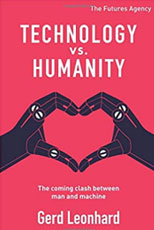
Futurist Gerd Leonhard breaks new ground again by bringing together mankind’s urge to upgrade and automate everything—down to human biology itself—with our timeless quest for freedom and happiness. Before it’s too late, we must stop and ask the big questions: How do we embrace technology without becoming it? When it happens—gradually, then suddenly—the machine era will create the greatest watershed in human life on Earth. Technology vs. Humanity is one of the last moral maps we’ll get as humanity enters the Jurassic Park of Big Tech. Artificial intelligence. Cognitive computing. The Singularity. Digital obesity. Printed food. The Internet of Things. The death of privacy. The end of work-as-we-know-it, and radical longevity: The imminent clash between technology and humanity is already rushing towards us. What moral values are you prepared to stand up for—before being human alters its meaning forever? Gerd Leonhard is a new kind of futurist schooled in the humanities as much as in technology. In his most provocative book to date, he explores the exponential changes swamping our societies, providing rich insights and deep wisdom for business leaders, professionals and anyone with decisions to make in this new era. If you take being human for granted, press Reset now with this passionately argued call to create a genuinely braver new world.
Must-read books according to the Top Business Schools
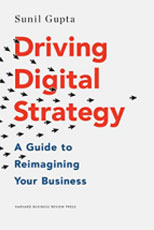
Digital transformation is no longer news–it’s a necessity.
Despite the widespread threat of disruption, many large companies in traditional industries have succeeded at digitizing their businesses in truly transformative ways.
The New York Times, formerly a bastion of traditional media, has created a thriving digital product behind a carefully designed paywall. Best Buy has transformed its business in the face of Amazon’s threat. John Deere has formed a data-analysis arm to complement its farm-equipment business. And Goldman Sachs and many others are using digital technologies to reimagine their businesses. In Driving Digital Strategy, Harvard Business School professor Sunil Gupta provides an actionable framework for following their lead.
For over a decade, Gupta has studied digital transformation at Fortune 500 companies. He knows what works and what doesn’t. Merely dabbling in digital or launching a small independent unit, which many companies do, will not bring success. Instead you need to fundamentally change the core of your business and ensure that your digital strategy touches all aspects of your organization: your business model, value chain, customer relationships, and company culture. Gupta covers each aspect in vivid detail while providing navigation tips and best practices along the way.
Filled with rich and illuminating case studies of companies at the forefront of digital transformation, Driving Digital Strategy is the comprehensive guide you need to take full advantage of the limitless opportunities the digital age provides.
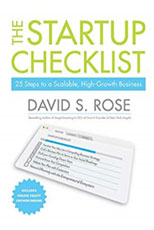
25 Steps to Found and Scale a High-Growth Business
The Startup Checklist is the entrepreneur’s essential companion. While most entrepreneurship books focus on strategy, this invaluable guide provides the concrete steps that will get your new business off to a strong start. You’ll learn the ins and outs of startup execution, management, legal issues, and practical processes throughout the launch and growth phases, and how to avoid the critical missteps that threaten the foundation of your business. Instead of simply referring you to experts, this discussion shows you exactly which experts you need, what exactly you need them to do, and which tools you will use to support them—and you’ll gain enough insight to ask smart questions that help you get your money’s worth. If you’re ready to do big things, this book has you covered from the first business card to the eventual exit.
Over two thirds of startups are built on creaky foundations, and over two thirds of startup costs go directly toward cleaning up legal and practical problems caused by an incomplete or improper start. This book helps you sidestep the messy and expensive clean up process by giving you the specific actions you need to take right from the very beginning.
- Understand the critical intricacies of legally incorporating and running a startup
- Learn which experts you need, and what exactly you need from them
- Make more intelligent decisions independent of your advisors
- Avoid the challenges that threaten to derail great young companies
The typical American startup costs over $30,000 and requires working with over two dozen professionals and service providers before it even opens for business—and the process is so complex that few founders do it correctly. Their startups errors often go unnoticed until the founder tries to seek outside capital, at which point they can cost thousands of dollars to fix. . . or even completely derail an investment. The Startup Checklist helps you avoid these problems and lay a strong foundation, so you can focus on building your business.

Everyone knows that high IQ is no guarantee of success, happiness, or virtue, but until Emotional Intelligence, we could only guess why. Daniel Goleman’s brilliant report from the frontiers of psychology and neuroscience offers startling new insight into our “two minds”—the rational and the emotional—and how they together shape our destiny.
Through vivid examples, Goleman delineates the five crucial skills of emotional intelligence, and shows how they determine our success in relationships, work, and even our physical well-being. What emerges is an entirely new way to talk about being smart.
The best news is that “emotional literacy” is not fixed early in life. Every parent, every teacher, every business leader, and everyone interested in a more civil society, has a stake in this compelling vision of human possibility.

Gallup presents the remarkable findings of its revolutionary study of more than 80,000 managers in First, Break All the Rules, revealing what the world’s greatest managers do differently. With vital performance and career lessons and ideas for how to apply them, it is a must-read for managers at every level.
Included with this re-release of First, Break All the Rules: updated meta-analytic research and access to the Clifton StrengthsFinder assessment, which reveals people’s top themes of talent, and to Gallup’s Q12 employee engagement survey, the most effective measure of employee engagement and its impact on business outcomes.
What separates the greatest managers from all the rest?
They actually have vastly different styles and backgrounds. Yet despite their differences, great managers share one common trait: They don’t hesitate to break virtually every rule held sacred by conventional wisdom. They don’t believe that, with enough training, a person can achieve anything he sets his mind to. They don’t try to help people overcome their weaknesses. And, yes, they even play favorites.
In this longtime management bestseller, Gallup presents the remarkable findings of its massive in-depth study of great managers. Some were in leadership positions. Others were front-line supervisors. Some were in Fortune 500 companies; others were key players in small, entrepreneurial firms. Whatever their circumstances, the managers who ultimately became the focus of Gallup’s research were those who excelled at turning each individual employee’s talent into high performance.
Gallup has found that the front-line manager is the key to attracting and retaining talented employees. This book explains how the best managers select an employee for talent rather than for skills or experience, set expectations, build on each person’s unique strengths rather than trying to fix his or her weaknesses, and get the best performance out of their teams.
And perhaps most important, Gallup’s research produced the 12 simple statements that distinguish the strongest departments of a company from all the rest. First, Break All the Rules is the first book to present this essential measuring stick and to prove the link between employee opinions and productivity, profit, customer satisfaction and the rate of turnover.
First, Break All the Rules presents vital performance and career lessons for managers at every level — and best of all, shows you how to apply them to your own situation.
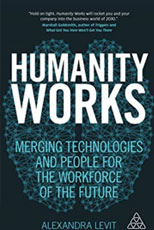
The professional landscape is transforming, and the only way to maintain competitive advantage is to maximize the unique skills of your workforce. In Humanity Works, bestselling author, global workplace consultant and futurist Alexandra Levit provides a guide to making the most of the human traits of creativity, judgement, problem solving and interpersonal sensitivity. Revealing what the ‘robot takeover’ will really look like, how talent and machines can work side by side and how you can make organizational structures more agile and innovation focused, this book will prepare you to lead organizations of the future.
Humanity Works doesn’t just explain the fascinating trends of the future of work; it condenses cutting-edge academic and business thinking to show what you can do about the future right now. Original, real-life case studies including Nestle, The Washington Post, Deloitte, and Pepsi combined with exercises and workplace tools will equip you for staying innovative and successful in the wake of major workplace disruption. Everything hinges on capturing the human edge in your organization.
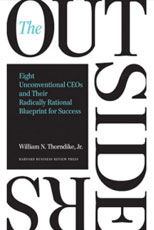
What makes a successful CEO? Most people call to mind a familiar definition: “a seasoned manager with deep industry expertise.” Others might point to the qualities of today’s so-called celebrity CEOs—charisma, virtuoso communication skills, and a confident management style. But what really matters when you run an organization? What is the hallmark of exceptional CEO performance? Quite simply, it is the returns for the shareholders of that company over the long term.
In this refreshing, counterintuitive book, author Will Thorndike brings to bear the analytical wisdom of a successful career in investing, closely evaluating the performance of companies and their leaders. You will meet eight individualistic CEOs whose firms’ average returns outperformed the S&P 500 by a factor of twenty—in other words, an investment of $10,000 with each of these CEOs, on average, would have been worth over $1.5 million twenty-five years later. You may not know all their names, but you will recognize their companies: General Cinema, Ralston Purina, The Washington Post Company, Berkshire Hathaway, General Dynamics, Capital Cities Broadcasting, TCI, and Teledyne. In The Outsiders, you’ll learn the traits and methods—striking for their consistency and relentless rationality—that helped these unique leaders achieve such exceptional performance.
Humble, unassuming, and often frugal, these “outsiders” shunned Wall Street and the press, and shied away from the hottest new management trends. Instead, they shared specific traits that put them and the companies they led on winning trajectories: a laser-sharp focus on per share value as opposed to earnings or sales growth; an exceptional talent for allocating capital and human resources; and the belief that cash flow, not reported earnings, determines a company’s long-term value.
Drawing on years of research and experience, Thorndike tells eye-opening stories, extracting lessons and revealing a compelling alternative model for anyone interested in leading a company or investing in one—and reaping extraordinary returns.
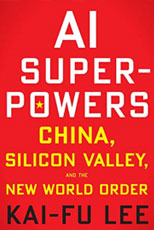
In AI Superpowers, Kai-fu Lee argues powerfully that because of these unprecedented developments in AI, dramatic changes will be happening much sooner than many of us expected. Indeed, as the US-Sino AI competition begins to heat up, Lee urges the US and China to both accept and to embrace the great responsibilities that come with significant technological power. Most experts already say that AI will have a devastating impact on blue-collar jobs.
But Lee predicts that Chinese and American AI will have a strong impact on white-collar jobs as well. Is universal basic income the solution? In Lee’s opinion, probably not. But he provides a clear description of which jobs will be affected and how soon, which jobs can be enhanced with AI, and most importantly, how we can provide solutions to some of the most profound changes in human history that are coming soon
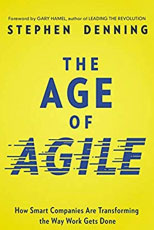
An unstoppable business revolution is under way–and it is Agile. Sparking dramatic improvements in quality, innovation, and speed-to-market, the Agile movement has helped companies both large and small learn to connect everyone and everything . . . all the time.With rapidly evolving consumer needs and technology that is that is being updated quicker than ever before, businesses are recognizing how vitally essential it is adapt. And adapt quickly. The Agile movement enables a team, unit, or enterprise to nimbly acclimate and upgrade products and services to meet these constantly changing needs.Filled with examples from every sector, The Age of Agile helps readers:
• Master the three laws of Agile Management (team, customer, network)
• Embrace the new mindset
• Overcome constraints
• Employ meaningful metrics
• Make the entire organization Agile
• And more!Companies don’t need to be born Agile.
With the groundbreaking formulas laid out in this book, even global giants can learn to act entrepreneurially. Your company’s future may depend on it!




